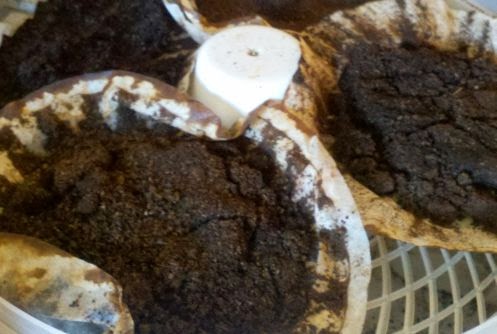Is It Safe to Dump Coffee Grounds Down the Sink? - Understanding the Risks
Is It Safe to Dump Coffee Grounds Down the Sink? - Understanding the Risks
Blog Article
We have discovered the article about Should You Put Coffee Grounds Down the Sink? directly below on the internet and figured it made perfect sense to talk about it with you on this site.

If you're an avid coffee drinker, you could be questioning the best means to dispose of your coffee premises. While it may appear hassle-free to clean them down the sink, this practice can cause a number of problems for both your plumbing and the environment. In this post, we'll discover whether it's safe to put coffee grounds down the sink and go over alternate disposal techniques to take into consideration.
Dangers of Putting Coffee Grounds Down the Sink
Plumbing Issues
Among the key interest in dealing with coffee premises down the sink is the threat of obstructing your pipelines. Coffee grounds don't dissolve in water and can gather in time, forming a dense sludge that can obstruct drains pipes and result in costly plumbing repair services.
Environmental Impact
Beyond the possible damages to your plumbing, putting coffee premises down the sink can additionally hurt the environment. When cleaned into the sewer system, coffee grounds can contribute to obstructions in sewage system lines and therapy facilities. Additionally, the high focus of organic matter in coffee premises can deplete oxygen degrees in waterways, negatively influencing aquatic life.
Alternatives to Disposing of Coffee Grounds
Composting
One green alternative for dealing with coffee premises is to compost them. Coffee premises are rich in nitrogen, making them a superb addition to compost piles or containers. As they disintegrate, they include nutrients to the dirt, enhancing its fertility and appearance.
Trash Disposal
If you don't have a composting configuration, one more alternative is to just throw your coffee grounds in the trash. Make certain to seal them in a compostable bag or container to prevent smells and leakage. While this technique does not supply the same environmental benefits as composting, it's a safe and convenient way to take care of coffee grounds.
Tips for Proper Disposal
Use a Sink Strainer
To prevent coffee premises from entering your sink's drainpipe in the first place, take into consideration using a sink filter. These low-cost devices catch strong bits, consisting of coffee grounds, avoiding them from causing blockages.
Regular Maintenance
Despite how you choose to take care of your coffee grounds, it's vital to preserve your plumbing consistently. Arrange periodic drain cleansings to get rid of any type of accumulation and guarantee that your pipes remain clear and free-flowing.
Verdict
While it may be appealing to clean coffee premises down the sink for convenience, doing so can have major effects for your plumbing and the setting. Rather, consider composting your coffee grounds or taking care of them in the garbage. By adopting responsible disposal practices, you can appreciate your coffee guilt-free while minimizing your ecological impact.
Coffee Grounds Down The Drain: Are They OK?
Can Coffee Grounds Go Down the Sink?
You may be thinking, “But I pour them down the sink drain every day and I’ve never had a clogged drain!” You see, coffee grounds come from coffee beans, which are virtually rock hard by the time they’re ground and brewed. You certainly wouldn’t want to grind up the pit from a peach, apricot, or nectarine that is about just as hard because they wouldn’t break down like other foods, and it’s the same with coffee beans!
If you usually grind coffee beans in the garbage disposal because it seems the cleanest and convenient, we don’t fault you for that. And anyone who has ever had to clean up the trash with spilled coffee grounds after a dog got into it would understand the rationale. Unfortunately, coffee grounds do not break down in water, so instead of grinding up and washing away as normal foods do in a garbage disposal, they clump together and as time goes by, the grounds can form a clump and pack the drain until it develops a clog.
What to Do With Coffee Grounds
So, what do you do with coffee grounds if you can't put them down the drain? You could of course just throw them in the garbage, but we encourage you to give these practical uses for them a try!
Since coffee grounds contain key minerals for plant growth, you can use them to fertilize your garden. Coffee grounds not only fertilize gardens because they are mineral-rich, but they are also great at absorbing contaminants in the soil, particularly heavy metals. Coffee grounds are said to attract worms, which help gardens flourish. You can use coffee grounds as fertilizer by sprinkling them around your plants. You can compost your coffee grounds and use them at a later time. Coffee grounds are great insect repellents when you place them in bowls or sprinkle them around the areas you want to repel insects. To remove fleas from your dog or cat, simply shampoo your pet then rub coffee grounds throughout their fur. Rinse them off and dry as usual. Like baking soda, used coffee grounds can eliminate odors. You can place them in a bowl in the fridge and let them do the work! Mix coffee grounds with coconut oil for a wonderful face or body scrub, or to reduce the appearance of cellulite. https://www.wintershomeservices.com/blog/2019/august/coffee-grounds-down-the-drain-are-they-ok-/

Hopefully you enjoyed our topic about Can Coffee Grounds Go Down the Drain or Sink?. Thank you for spending some time to read through our article. Are you aware of somebody else who is intrigued by the niche? Feel free to promote it. We take joy in reading our article about Should You Put Coffee Grounds Down the Sink?.
Book Today Report this page